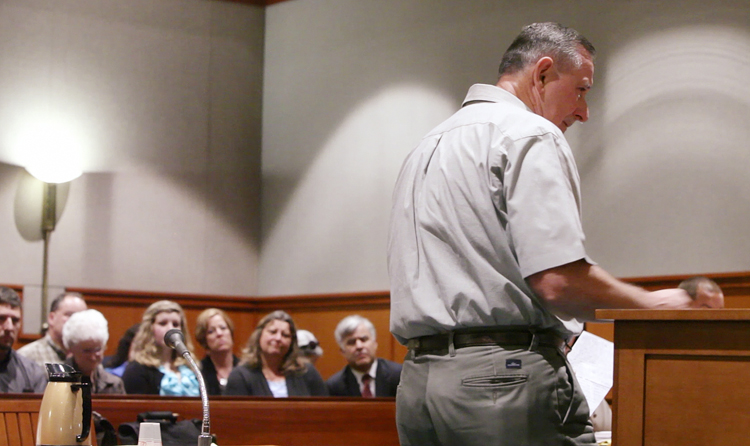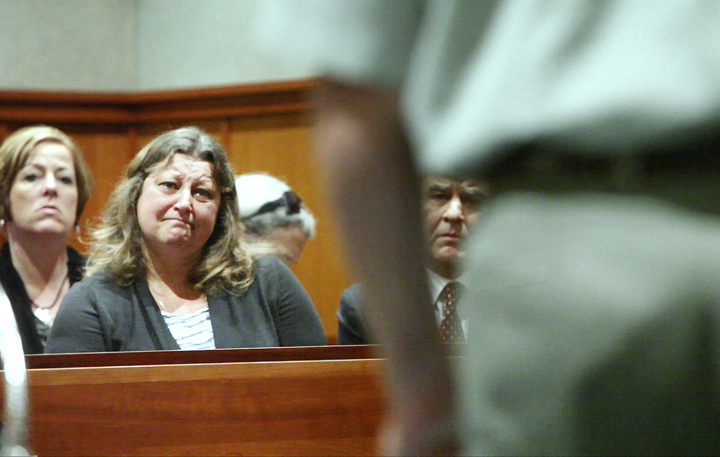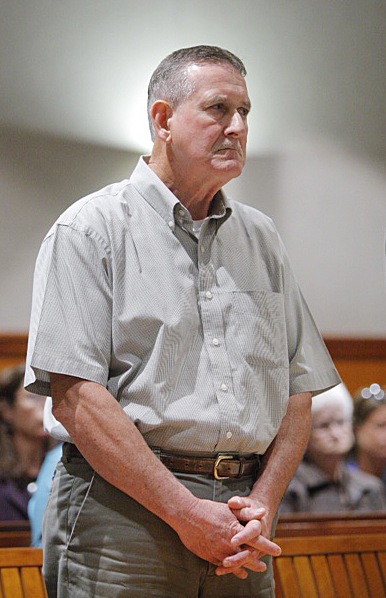PORTLAND — From the moment she learned of her husband’s death, Lisa Kolofsky’s heart went out to the man who shot him while each was hunting.
She explained this in a courtroom crowded with relatives and friends of her husband, Peter Kolofsky, for the sentencing of William Briggs. Kolofsky’s death left their two children without a father and her without the man who continues to melt her heart 30 years after their first date.
Briggs, 61, of Windham, killed Peter Kolofsky in Sebago last fall when he fired at movement he took to be a deer. Briggs, a Central Maine Power Co. supervisor with no criminal history, pleaded guilty to manslaughter on Thursday. In accordance with a plea agreement, he was sentenced to three years in prison – with all but 45 days suspended – and four years of probation that will include 500 hours of community service related to hunting safety.
Before Superior Court Justice Roland Cole imposed the sentence, Lisa Kolofsky said she didn’t have the energy to be angry. She had to focus on her children – 16-year-old Maria and 10-year-old Thomas – and their lives without Peter. At one point, she turned from the podium to speak directly to Briggs.
“Today, I ask you to forgive yourself and to please work to educate other hunters so no one has to walk in our shoes,” she said. Then she addressed supporters, some of whom sobbed: “I’m asking each of you to find it in your hearts to forgive Mr. Briggs because that’s what Pete would have done.”
Kolofsky, 46, was a carpenter, commercial fisherman and enthusiastic outdoorsman. His wife spoke of a sparkle in his eye that made people wonder what he was up to, his adoration of their children and his generosity to others. Maria Kolofsky described herself as a “daddy’s girl,” whose father won’t witness her 18th birthday, walk her down the aisle at her wedding or spoil the children she will have someday.
Jay Halle, a friend since kindergarten, spoke of Peter Kolofsky’s infectious laugh and the way he would rub has hands together in anticipation of a venison meal.
Kolofsky was killed not far from his home on Hogfat Hill Road on Nov. 5. Maria Kolofsky dropped him off there and Briggs and his brother arrived later, around 4 p.m. The brothers went in different directions and Briggs positioned himself by a large rock near a tote road. All the men were experienced hunters.
Briggs told authorities he saw a bull moose cross the tote road and believed it would move deer, Assistant Attorney General Leane Zainea said during the proceeding. Briggs thought he saw the rack of a small deer, but he did not see the body. He fired twice toward the movement without identifying either the head or the torso of a deer.
Briggs found Kolofsky on the ground, rolled him over and immediately called 911 when he saw blood, Zainea said. Kolofsky was wearing a blaze orange vest and a blaze orange cap was nearby. A moose antler was by a stump.
Kolofsky was pronounced dead at the scene. He had been killed by a single gunshot.
Zainea said photographs taken during the investigation indicated that Briggs’ view was obstructed, and that given the distance of a couple of hundred yards, he would not have been able to see Kolofsky even though he was wearing blaze orange.
The Maine Warden Service characterized the incident as a textbook case of failing to make proper target identification. State law requires hunters to positively identify their targets with an unobstructed view of the target’s head and torso before firing.
The target-identification law took effect in 1991. It was prompted by the fatal shooting in 1988 of Karen Wood, who was fatally shot by a hunter while she was hanging clothes on a line in the yard of her Hermon home. The hunter, Donald Rogerson of Bangor, was acquitted of manslaughter.
Zainea said that the base sentence for similar cases, of which there are not many, is four to five years. Mitigating factors included Briggs’ cooperation with law enforcement, his lack of a criminal history, his clear remorse and the acceptance of responsibility, she said.
Briggs apologized to the Kolofsky family in a soft voice that was nearly inaudible at times. He removed his eyeglasses to wipe away tears as he spoke. He said he was sorry for the pain and suffering he had caused and that he will pray for them every day and night.
“I know that when my days are done on this earth, I will stand before my God and he will judge me for the good that I’ve done on this earth and for the bad that I’ve done – and for what I failed to do,” he said. “And only then will it be done.”
Staff Writer Ann S. Kim can be
contacted at 791-6383 or at:
akim@pressherald.com
Twitter: AnnKimPPH
Send questions/comments to the editors.





Comments are no longer available on this story